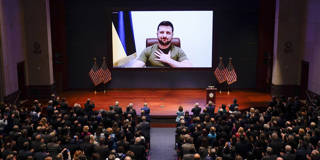While hard military power will decide the outcome of Russia's war in Ukraine, the power of values, persuasion, and attraction are hardly irrelevant. Though soft power tends to operate more subtly and over a longer time horizon, it has nonetheless emerged as a key feature of Ukraine's defense.
CAMBRIDGE – As Russian missiles pound Ukrainian cities, and as Ukrainians fight to defend their country, some avowed realists might say, “So much for soft power.” But such a response betrays a shallow analysis. Power is the ability to affect others to get the outcomes you want. A smart realist understands that you can do this in three ways: by coercion, by payment, or by attraction – in other words, the proverbial “sticks, carrots, and honey.”

CAMBRIDGE – As Russian missiles pound Ukrainian cities, and as Ukrainians fight to defend their country, some avowed realists might say, “So much for soft power.” But such a response betrays a shallow analysis. Power is the ability to affect others to get the outcomes you want. A smart realist understands that you can do this in three ways: by coercion, by payment, or by attraction – in other words, the proverbial “sticks, carrots, and honey.”